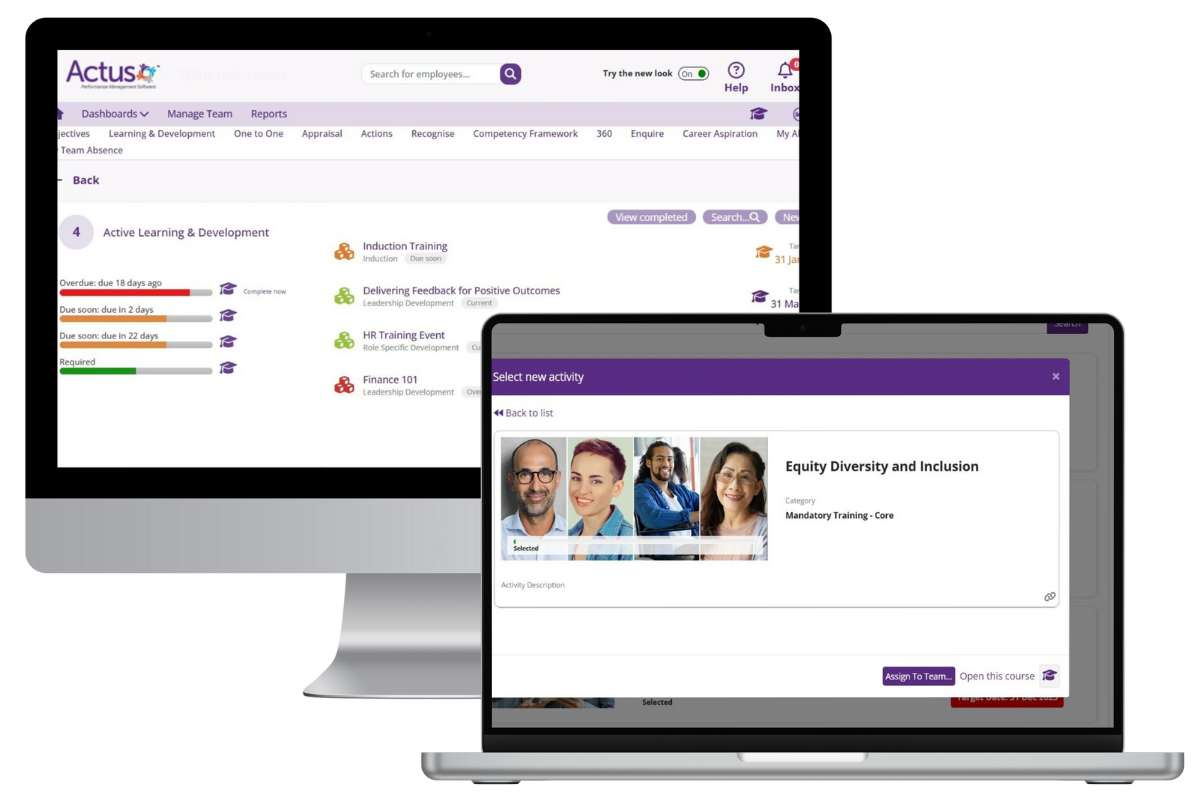Get in touch with us today!
If you have any questions, enquiries or just want to say how much you like us (or what we can do better), please drop us a line.
We were shocked to discover that 79% of polled respondents on a recent Actus webinar stated that they did not have an effective learning culture. Considering how many of us are still predominantly home based, including those starting new roles and jobs for the first time, it is clear that we all need to be effective at learning. if line managers don’t have the skill, knowledge or inclination to support their people to learn and grow effectively regardless of location, our skills and productivity are going to decline. If we are to get the best out of our people, we need to encourage people to own their own learning and development, to weave it through daily and weekly activities, to truly make learning cultural.
In this blog, we will explore 7 tips you can use to create (or redefine) an effective learning culture.
We need to eradicate learning being treated as an afterthought, a ‘tick-box’ activity or reward. The first step to creating a learning culture is to promote its importance and for it to be seen as a priority. This means recognising learning as an organisational core value, establishing it within your HR and business processes. Do you promote ‘lessons learned’ debriefs or ensure that everyone has a development plan as part of your performance management process for instance? The CIPD has a great piece of research that looks in detail at the evidence of the many benefits of having an effective learning culture. Certainly, this includes growth, profitability, transformation and productivity at an organisational level. In addition, employees have greater job satisfaction, and organisational commitment. Clearly, these are all highly important areas, especially within the realms of virtual working!

Once you have established learning as a key part of your organisational culture in principle, we need to identify role models or visual examples of people embodying best practices. This may not be straight-forward, especially when we aren’t all sharing the same physical space. We could start by involving key influencers, whether that be departmental heads or team leaders, and communicate to them the importance of modelling a culture of learning. Once on-board, they can start to demonstrate best practices to their teams.
Perhaps by sharing their own learning goals and asking teams to submit their own for feedback. This is not meant to be seen as added work or viewed as a ‘checking-up with’ exercise (download our infographic on building trust in a virtual workplace here). It is more about inspiring our teams to take ownership of their own learning needs whilst ensuring they feel supported.
It is so powerful when key stakeholders stress the importance of setting time aside each week to focus on their own learning. This could be as simple as suggesting employees go for a walk and listen to a podcast, and this also has a positive impact on wellbeing (download our resources on supporting employee wellbeing here). Having this time for learning scheduled helps employees recognise its importance. It is also far more likely to take place if it is initiated from the top. Learning will vary from role to role and on the job learning is particularly valuable.
For software developers, for instance, learning may simply be actively learning coding and problem solving (listen to our podcast on how to help people to learn remotely here). Marketeers might learn new skills by watching YouTube videos or networking with peers. Certainly, knowing and understanding the needs and demands of different roles should influence the learning styles you recommend.
On our recent learning & development webinar, participants told us that the lowest, readily available type of learning in their organisation was mentoring (32%). Even then, some of the attendees only had mentoring in pockets which were not formally standardised. A frequent query was how to set up a formal mentoring programme in a remote working environment. This process has been outlined below supported by a webinar link.
Ideally, you should create a programme that can grow organically with mentees becoming mentors for future employees. It should start small, adjusting to any kinks in the process, then expand to the wider organisation. First, begin with considering what a good mentor should look like. Think about how you would define the role as well as defining the rules around how much work should be involved. With this, you can start to recruit suitable mentors. They may even be willing to help you by running online workshops to define expectations and ground rules.
The next step to consider is how to match the first lot of mentors with mentees. The mentor should be outside of the direct line, but be able to provide relevant guidance for the mentee. By being out of the direct line, it should hopefully foster a more mutual friendship. Therefore, increasing the ease of knowledge sharing in both an informal and formal way. Clearly, you will also need to define a process for escalations or relationship breakdown in the event of a ‘mismatch’. Crucially, it is important to not be discouraged by any challenges or ‘mismatches’. Use these to review and improve your mentoring programme.
Webinar: How to make mentoring work in your organisation
Reinvigorating everyone’s interest in learning can be challenging, so how can we ensure that our organisation doesn’t revert back to old habits? Well, one way is to put in place personalised learning/development plans as part of your standard performance management process. By tailoring learning for each employee with goals they can head towards personally. Creating an effective learning culture for a digital world is not easy, but using an online performance management tool can certainly help to embed this process seamlessly. Actus performance management software allows you to review the process at different stages of the learning journey and can be reviewed within the appraisal process. It is no longer about completing a course. Creating this bigger picture by having a learning plan helps to move away from a ‘tick-box’ approach.
Certainly, the past few years have been challenging at work. Employees may feel that opportunities to progress in their personal and professional life have been stunted. However, by taking personalised learning plans one step further and identifying career opportunities, we can close any skill gaps and help to progress talent management and internal career opportunities. Not only will this negate the costs associated with hiring externally but it shows that you are investing in your people and will help to retain and motivate your talent.
Once you have both the processes and investment from key leaders in place, it is important to recognise and reward model learning behaviours from all employees. By recognising employees, you are encouraging them and others to do more. These can be as simple as soft rewards such as ‘learner of the week’. Or potentially recognising them through your performance management tool. If you have the use of an LMS, some provide badges and other virtual rewards for learning success. It is helpful to take a strategic approach to recognising learning success if you want to embed a true learning culture where learning is aligned to knowledge gaps or career development.
One example of a model behaviour that you should recognise and encourage, is establishing on the job learning opportunities like formal or informal knowledge sharing. This not only fosters a great team spirit of working together (critical in a hybrid workplace) but also helps upskill the rest of the team to be able to do tasks that sit slightly outside their existing skillset in the event of unexpected absences. A soft way of encouraging this would be to give honorary titles, such as the ‘Website Guru’, or ‘Client Service Star’.
In addition, this helps with onboarding new starters and creates a great company culture. As they know who they can turn to if they have questions for various topics or departments. The key to remember is that rewards don’t need to be monetary or expensive. Even a monthly Amazon gift card prize can be an incentive. Crucially, the idea is to ‘pat them on the back’, to encourage the continuation of an effective learning culture.

Lastly, but by no means least, our final tip is ensuring access to learning resources. This includes making both internal and external training materials and resources easy to find so people can learn at their own pace. For example, external resources should be signposted. E.g. by having a list of recommended sites for digital learning or providing a schedule of relevant upcoming webinars for employees to sign up to.
Continuous learning is so important and it is not a one size fits all approach for employee development. Some people yearn for face to face training and others are happy to learn on the job or be self taught. Offering variety is the key to a vibrant learning culture and companies that encourage a growth mindset where people feel psychologically safe enough to make mistakes and see them as part of the learning process will also benefit from greater retention and employee engagement.
Internally, you may use an LMS system like Actus that offers a variety of courses and tracks development. Furthermore, to encourage knowledge-sharing, when a new skill is learnt, employees could create ‘how-to’ videos and upload these to the LMS themselves so that this knowledge can be shared.
Of course, learning can come in many forms. In previous CIPD research, they explored the usefulness of training received for many of the types of learning listed below. They found that whilst a small percentage may have only undertaken these various types of learning, the vast majority found them to be incredibly useful, with most given usefulness of above 80%.
Whilst we have provided our 7 tips on creating a learning culture, they are just suggestions. What works for one business might not work for another. Above all, the key is to take a step back and evaluate the overall learning environment that currently exists. Then you can start to reflect and improve as necessary. You can think about how you can align the current learning culture to meet the business need. Consider what can be done to refresh or incentivise learning. Asking questions like ‘How varied and relevant is the learning content?’. ‘Is learning available at the point of need?’. ‘What do people want or need?’. A truly effective learning culture will evolve with your business, and provide highly-skilled employees.

Part of our ethos is to help build a better workplace for people, whatever their location. We achieve this through great performance management software, the HR Uprising Podcast, and a variety of free thought leadership resources. Therefore, if you would like to learn more about this topic, you can find some additional resources below.
Learning and Development Resources
Podcast: How to Build a Learning Culture
We have a whole host of free learning management resources, available to download from our website. Including the following:
Follow us on Social Media for the latest HR resources and upcoming live webinars with Lucinda.
Actus LinkedIn Actus Instagram Actus YouTube Actus Facebook Actus X
Please complete the details to receive a 3 minute system tour direct to your inbox!
If you are looking for performance management software for 1000+ employees get in touch for a quote today.
Talk to one of our partnership specialists today.
Fill in your details below and then please check your email for a link to the 3 minute overview of Actus Software
If you have any questions, enquiries or just want to say how much you like us (or what we can do better), please drop us a line.